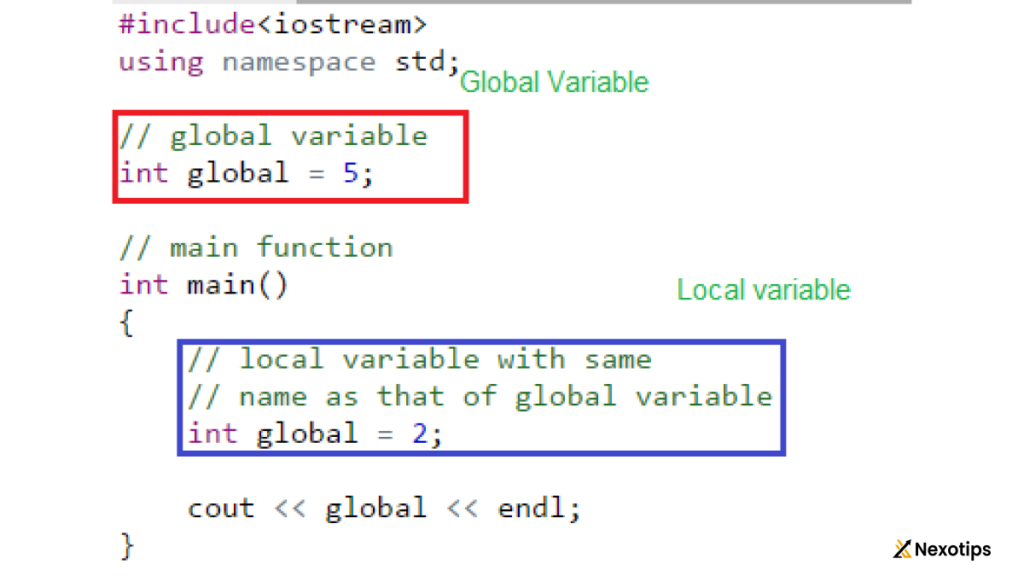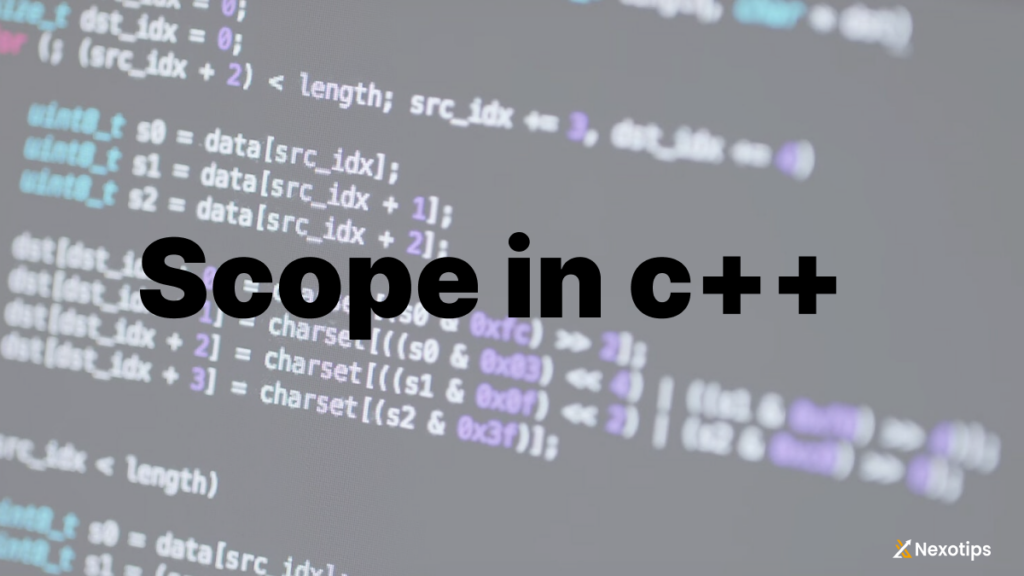
Elevate Your Programming with C++ Scope : A Deep Dive for 2024
Table of Contents
C++ Scope is a versatile programming language that offers powerful features for system programming, game development, and real-time simulations. One of the fundamental concepts in C++ is scope, which determines the visibility and lifetime of variables and functions within a program. Proper understanding and management of C++ scope are crucial for writing efficient and error-free code.
In this blog, we will delve into the different types of scopes in C++, their significance, and best practices for managing C++ scope in your programs.
What is C++ Scope?
C++ Scope refers to the region of the code where a variable or a function is accessible. It defines the context in which a name (such as a variable or a function) can be used. In C++, scopes can be broadly categorized into the following types:
- Global Scope
- Local Scope
- Namespace Scope
- Class Scope
- Function Scope
- Block Scope
- File Scope
Each type of C++ scope serves a specific purpose and has its own set of rules for visibility and lifetime.
1. Global Scope
A variable or function declared outside of any function or class is said to be in the global C++ scope. These entities are accessible throughout the entire program, from the point of their declaration to the end of the program. Global C++ scope is often used for defining constants and variables that need to be shared across multiple files or functions.
Pros and Cons of Global Scope
Pros:
- Easy access to shared variables across different functions and files.
- Useful for defining constants and configuration settings.
Cons:
- Can lead to naming conflicts and unexpected behaviors.
- Makes code harder to maintain and debug.
- Increases the risk of accidental modifications.
2. Local Scope
Local scope refers to variables declared within a function or a block. The variables can only be accessed within the function or block where they have been declared. Once the function or block ends, the variables go out of scope and are destroyed.
#include <iostream>
void displayLocalVar() {
int localVar = 5; // Local scope
std::cout << "Local Variable: " << localVar << std::endl;
}
int main() {
displayLocalVar();
// localVar is not accessible here
return 0;
}
Pros and Cons of Local Scope
Pros:
- Encapsulation of variables, reducing the risk of unintended modifications.
- Easier to manage and debug code.
- Helps in preventing naming conflicts.
Cons:
- Limited access to variables, which might require passing variables as function parameters.
3. Namespace Scope
Namespaces are used to organize code into logical groups and prevent name conflicts. A namespace defines a C++ scope for its members, which can include variables, functions, classes, and other namespaces. Members of a namespace are accessed using the C++ scope resolution operator ::.
#include <iostream>
namespace MyNamespace {
int var = 10;
void displayVar() {
std::cout << "Namespace Variable: " << var << std::endl;
}
}
int main() {
MyNamespace::displayVar();
return 0;
}

Pros and Cons of Namespace Scope
Pros:
- Prevents name conflicts by providing a unique C++ scope for variables and functions.
- Helps in organizing code into logical groups.
Cons:
- Requires the use of the scope resolution operator for accessing members.
4. Class Scope
Class scope refers to the members of a class, including variables and functions. These members are only accessible within the class and its member functions, unless specified otherwise using access specifiers (public, protected, private).
#include <iostream>
class MyClass {
private:
int privateVar; // Private class scope
public:
MyClass(int var) : privateVar(var) {}
void displayVar() {
std::cout << "Class Variable: " << privateVar << std::endl;
}
};
int main() {
MyClass obj(10);
obj.displayVar();
// privateVar is not accessible here
return 0;
}
Pros and Cons of Class Scope
Pros:
- Encapsulation of data and functions within a class.
- Control over access to class members using access specifiers.
- Promotes data hiding and abstraction.
Cons:
- Limited access to class members, which might require using accessor and mutator functions.
5. Function Scope
Function C++ scope refers to variables declared within a function. These variables are only accessible within the function and are destroyed once the function exits. Function parameters also fall under function C++ scope .
#include <iostream>
void displayVar(int param) { // param has function scope
std::cout << "Function Parameter: " << param << std::endl;
}
int main() {
displayVar(10);
// param is not accessible here
return 0;
}
Pros and Cons of Function Scope
Pros:
- Encapsulation of variables within a function.
- Reduces the risk of unintended modifications and naming conflicts.
Cons:
- Limited access to variables, which might require passing variables as function parameters.
6. Block Scope
Block scope refers to variables declared within a block, which is a set of statements enclosed in curly braces {}. These variables are only accessible within the block and are destroyed once the block exits. This includes loops, conditionals, and other code blocks.
#include <iostream>
int main() {
{
int blockVar = 5; // Block scope
std::cout << "Block Variable: " << blockVar << std::endl;
}
// blockVar is not accessible here
return 0;
}
Pros and Cons of Block Scope
Pros:
- Encapsulation of variables within a block.
- Reduces the risk of unintended modifications and naming conflicts.
Cons:
- Limited access to variables, which might require duplicating variable declarations.
7. File Scope
File C++ scope refers to variables and functions declared outside of any function but with the static keyword. These entities are only accessible within the file in which they are declared. This is useful for internal linkage, ensuring that variables and functions are not accessible from other files.
#include <iostream>
static int fileVar = 10; // File scope
static void displayFileVar() {
std::cout << "File Variable: " << fileVar << std::endl;
}
int main() {
displayFileVar();
return 0;
}

Pros and Cons of File Scope
Pros:
- Ensures internal linkage, preventing name conflicts with other files.
- Provides controlled access to variables and functions within a file.
Cons:
- Limited access to variables and functions, which might require duplicating declarations in multiple files.
Best Practices for Managing Scope in C++
Effective management of C++ scope is crucial for writing efficient and maintainable C++ code. Here are some best practices to follow:
- Minimize Global Variables: Limit the use of global variables to avoid naming conflicts and accidental modifications. Use them only when absolutely necessary.
- Use Namespaces: Organize your code into namespaces to prevent name conflicts and logically group related code.
- Encapsulate Data: Use classes to encapsulate data and functions, and control access using access specifiers (
public,protected,private). - Limit Variable Scope: Declare variables in the smallest possible scope to reduce the risk of unintended modifications and improve code readability.
- Avoid Static Variables in Functions: Avoid using static variables within functions, as they maintain their state between function calls, which can lead to unexpected behavior.
- Use Const and constexpr: Use
constandconstexprto define constants and prevent accidental modifications. - Leverage RAII: Use Resource Acquisition Is Initialization (RAII) to manage resource lifetimes and ensure proper cleanup.
- Avoid Naming Conflicts: Choose meaningful and unique names for variables and functions to avoid naming conflicts.
- Use Scoped Enums: Use
enum classto define scoped enumerations, which provide better type safety and prevent naming conflicts. - Document Scope: Clearly document the scope and purpose of variables and functions in your code to improve readability and maintainability.
Conclusion
Understanding and managing scope in C++ is essential for writing efficient, maintainable, and error-free code. By following best practices and leveraging the different types of scopes effectively, you can ensure better organization, encapsulation, and control over your program’s variables and functions.
Remember, the key to mastering scope in C++ is practice and experience. As you continue to write and refactor code, you’ll develop a deeper understanding of how to manage scope effectively in various scenarios.
Read More : Mastering C++ Function Parameters : Unleash The Full Potential Of Your Code
